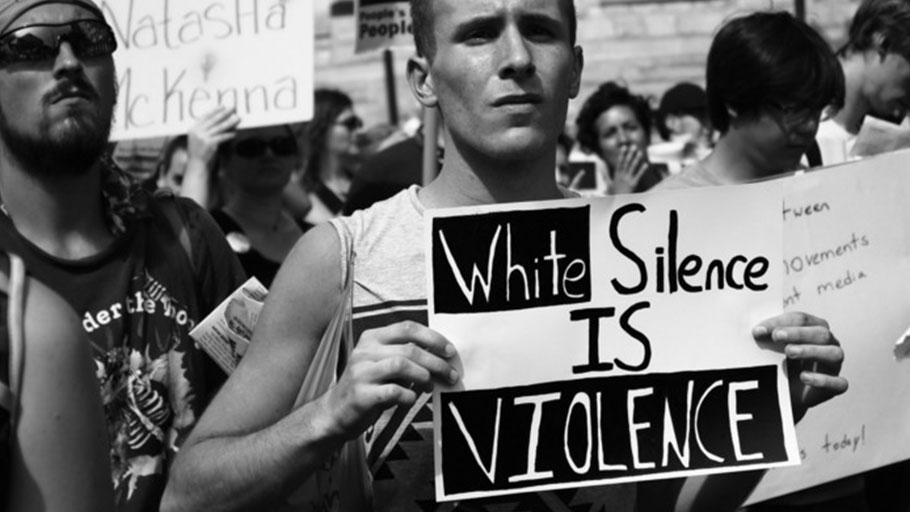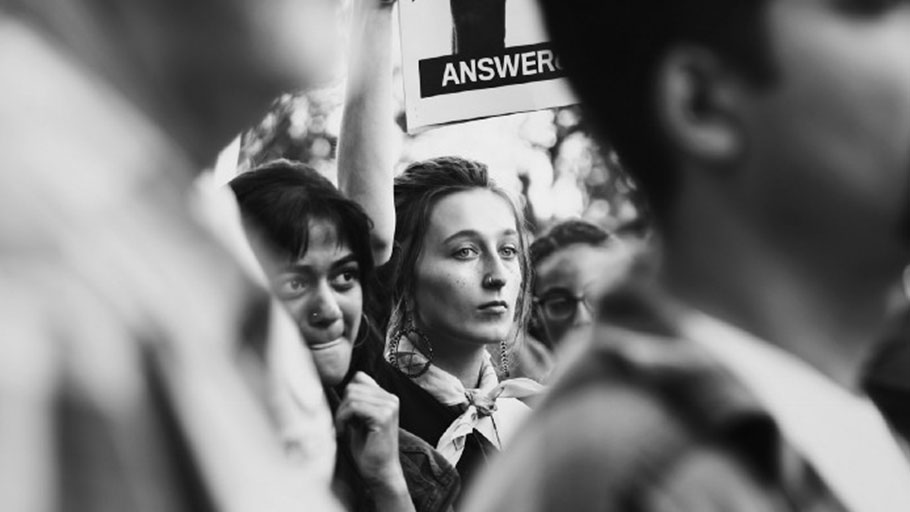Anti-racist white student at protest against hate speech at the University of a Southern California. All Photo Credits: Charles HF Davis III (@hfdavis)
“To be a Negro in this country and to be relatively conscious is to be in a rage almost all the time. ” – James Baldwin
I had trouble getting out of bed this morning. I abashedly moved my 9 o’clock meeting with my boss to give myself time to rise. I almost did what many Black folks joke about in private, yet often need to do (or wish they could do): “call out Black.” For those who don’t know what this is, it’s similar to “calling out sick” except it’s about reclaiming mental, emotional and even physical well-being after the infestation of injustice in our society becomes too overwhelming to think or move our bodies; so we can return to work more whole.
Black People individually and collectively do the routine work of healing and repairing ourselves at the emergence of a new hashtag, only to have to restart the process all over again the next week. It’s a cycle that has numbed many of us to an extent that even a global pandemic does not spark a major sense of panic among Black people who’ve only known a world that has always demonstrated blatant disregard for Black lives. Needing to call out of work because you’re Black is a very real result of historical trauma absorbed by Black People and internalized at community and individual levels. Because, for Black people living in America, simply existing is an act of courage, resistance, and protest.
But, like my Black colleagues and other People of Color, I try to show up and bring my “whole self” to work, aiming for Black excellence in every meeting, while still having to hold space for the pain and rage I’m feeling. Many of us in community are eager for more than words of acknowledgement from leadership in our companies. I am appreciative of the reflections from White People and non-Black people of color on work message boards and throughout social media. Your Black colleagues have been, for better or worse, fielding your emotions of “shock”, discomfort, sadness, and concern for the issues we face. Some of you have reached out to me in my DMs and others I’ve connected with personally, who are ultimately saying:
You want to do something, but you don’t know what to do.
So, I want to amplify the voices of community leaders who have been offering guidance in this space for years, in hopes so that you – our leaders as well as associates – can leverage it for your own personal transformation and then to model for your teams, colleagues and peers.
If you understand what is happening, what it means to the people most closely impacted, and what it should mean for societal reform, as well as your own personal transformation, then, perhaps, you’ll know what you can do to help.

Photo by Charles HF Davis III
So, adapted from guidance shared by Michelle Kim in an article she wrote to her community, combined with that of a variety of other community leaders and activists shared throughout social media (names and resources linked below), here is a summarized list of 20 actions White People and non-Black People of Color can take to show up for Black people right now:
- If you feel “shocked” or “confused” by the lynchings of Ahmaud Arbery, George Floyd, Breonna Taylor, Sean Reed, Nina Pop, and Tony McDade, recognize those feelings as indicators of how far off of your radar the realities of social injustice and systemic racism may be; and how far apart your world is from that of your Black friends and counterparts.
- Educate yourself first, then your family and friends about the injustices and violence Black peoples around the globe face.
- Go beyond following and reposting the weekly hashtags; learn the names and the stories of those who’ve been martyred without retribution or justice.
- Understand how police violence against Black people is a systemic issue rooted in historical and ongoing oppression, and not isolated incidents.
- Use this newly acquired knowledge and understanding to defend Black people when uninformed, ignorant opinions and oppressive, anti-Black ideas are voiced by members of your inner circle and your family.
- Call out company and community leaders and colleagues who minimize Black pain and/or equate it to the pain of other marginalized communities.
- Do the hard work required to unearth your own internalized anti-Blackness and reflect on how it shows up in your daily life.
- Begin the hard work of dismantling Whiteness – privilege, superiority, and the barometer by which we measure most things in our society and around the globe.
- Challenge the “model minority” myth, which, in part, implies that the lives of Black people and POC who fall short of some imagined criteria of success are expendable.
- Don’t put an additional burden on Black People to educate you now, or ever. Use all of the free resources available out there to benefit yourself.
- Follow the lead of your Black friends, colleagues, and leaders in our organization. Amplify and learn from them. Listen to them. Listen to them. Listen to them. Without ego and defensiveness.
- For non-Black People of Color, wrestle with ways you may have been socialized to become White-adjacent – as successful as White people, as fitting in and assimilated as White people, as deserving of dignity and respect as White people – and therefore may have adopted the language and beliefs of anti-Blackness and White Supremacy.
- Educate yourself on all of the work, Black and Indigenous people have done to make immigration and acceptance possible for your community.
- Don’t conflate the needs of other communities with those of Black People. Understand that it is a misnomer that all boats will rise simultaneously. Yes, we can parallel-path our respective agendas, but there’s no trickle-down effect like that of Black progress for other marginalized communities. Said another way, no matter what progress is made on behalf of sexual and gender minorities, Latinx, Asian Americans, or religious communities respectively, how truly free are we if America never recompenses for its original sin: the ongoing, simultaneous colonization, enslavement, and genocide of Black and indigenous bodies.
- Make a conscious effort to escape the social media bubble you may be living in right now and follow more Black leaders and thinkers across genres and mediums —Kimberle Crenshaw, Ijeoma Oluo, Brittany Packnett, Marc Lamont Hill, Ava DuVernay, Franchesca Ramsey.
- Showing up to protests is okay but please avoid performative behaviors of allyship. Instead, focus on doing the work of building coalition that is rooted in solidarity and trust. You can organize, too.
- Supervisors, extend grace and offer support to POCs in your vertical with regards to workstreams they may be driving. And, know that encouraging them to “take some time off” (by itself) is not an answer. Obviously, rest is needed in order to heal. Go further by asking what else your POC directs might need to be true to support the reparative process and a realistic balance of life inside and outside of work. And know that we’re not monlithic in this regard; we all need something a little different.
- Leaders, please recognize the past and ongoing work of existing Diversity & Inclusion task forces, committees, and councils at your company; work them into the corporate Diversity, Inclusion, and Belonging strategy; and STOP, STOP, STOP erasing the Black Women that have largely spearheaded D&I portfolios in every industry, for years.
- Associates, be an active participant in your organization’s D&I efforts. Showing up is only the first step. If you’re White, I encourage you to take an active role and start getting comfortable with stumbling a bit along the way. It’s not the responsibility of the minoritized, marginalized, and the oppressed to fix systemic racism and social injustice. If you’re at the table, you deserve and should receive grace. Feedback and correction from us is a gift.
- Understand that it’s possible that your fears won’t go away as you engage this subject matter. If you’re serious about self-transformation and having an impact, you’ll have to do a lot of this afraid.
With a whole lotta love,
M.
______________
Ways to demand justice:
- Demand justice for #AhmaudArbery; Text JUSTICE to 55156 to sign the petition.
- Demand justice for #DreasjonReed (Sean Reed). Read about what happened and share what you learn.
- Demand justice for #BreonnaTaylor who was shot 8 times by the cops who were at the wrong house while the actual suspect was already in police custody
Recommended Readings & Resources:
- Marc Lamont Hill, Nobody
- “20+ Allyship Actions for Asians to Show up for the Black Community Right Now” Michelle Kim
- Read Nikole Hannah-Jones’ The 1619 Project
- Decolonize your bookshelf
- Follow and read The Root &The Grio,
- 75 Things White People Can Do for Racial Justice [Article]
- “What does it mean to decolonize design?” [Article]
- bell hooks Feminism is for Everybody
- Feminsta Jones’ Reclaiming our space: How black feminists are changing the world from the tweets to the streets
- Langston Hughes’ The Ways of White Folks
- Keeanga Yamahtta-Taylor’s Race for Profit
Other social media accounts worth following:
- bell hooks https://twitter.com/bellhooks
- Jarrett Hill https://Twitter.com/jarretthill
- Alicia Garza https://twitter.com/aliciagarza
- Patrisse Cullors https://twitter.com/OsopePatrisse
- Charles H.F. Davis III https://twitter.com/hfdavis
- The New Jim Crow https://twitter.com/thenewjimcrow
- Ta-Nehisi Coates https://twitter.com/TaNehisiCoats
- Laverne Cox https://twitter.com/Lavernecox
- Rachel E. Cargle https://twitter.com/RachelCargle
- Kimberly Bryant https://twitter.com/6Gems
- Ericka Hart https://twitter.com/iHartEricka
- Minda Harts https://twitter.com/MindaHart
- Michelle Kim https://twitter.com/mjmichellekim
Michael J.A. Davis — Brand and Experience Designer. Ambivert discovering & confronting my inadequacies on an hrly basis. Traversing fatherhood, love, Black and Muslim identities.
Source: Medium















